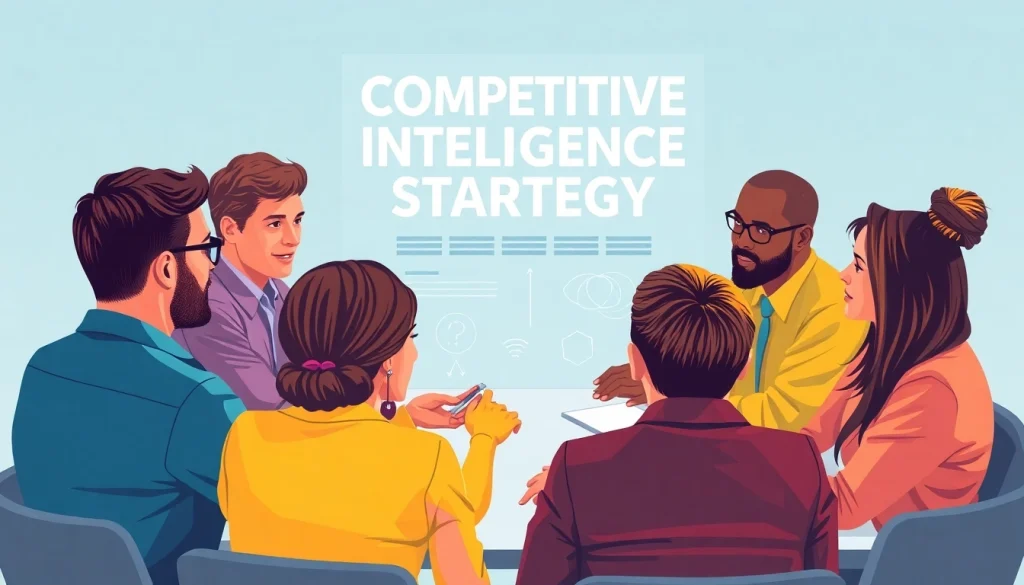Understanding Competitive Intelligence
What is Competitive Intelligence?
Competitive intelligence (CI) is a systematic, ethical process for gathering and analyzing information regarding products, domain expertise, customers, and competitors. It is fundamentally about understanding the marketplace better to create a strategic advantage. Firms use CI to predict market advancements, enhance their products, and effectively plan their business strategies.
The process often includes a variety of activities like data collection from public sources, successful case studies, customer feedback, and examining competitors’ strategies. By leveraging gathered insights, businesses can make informed decisions to improve their market performance. For those looking for a reliable competitive intelligence company, Aquate Intelligence, for example, specializes in these types of analyses.
The Importance of Competitive Analysis
Understanding competitive analysis is essential for any business aiming to maintain or gain a competitive edge. By continuously monitoring competitors, companies can adapt their strategies accordingly. Moreover, responsive strategic management based on competitive intelligence can lead to better customer targeting and enhanced brand loyalty.
Effective competitive analysis helps in identifying market opportunities, risks, and threats. Businesses can use these insights for product differentiation, pricing strategies, and service enhancements thereby ensuring they stay relevant in the market.
Common Misconceptions in Competitive Intelligence
Despite its significance, several misconceptions surround competitive intelligence:
- CI is all about spying: While CI does involve gathering information about competitors, ethical standards prevent illegal or immoral business practices.
- CI is not for smaller companies: Many believe that only large corporations can benefit from CI. In truth, small and medium enterprises can leverage CI to craft opportunities and growth strategies just as effectively.
- CI is a one-time project: The dynamic nature of the market necessitates continuous monitoring and revision of intelligence strategies to stay ahead.
Key Services Offered by Competitive Intelligence Companies
Market Research and Analysis
Market research is a cornerstone of competitive intelligence. This aspect involves gathering data about the market environment, industry trends, customer preferences, and potential demand for products or services. It is crucial for businesses to understand where they stand in the market to create effective strategies.
Advanced analytical techniques, including predictive analytics and trend modeling, provide companies with insights not only into current market conditions but also future possibilities.
Competitor Profiling Techniques
Competitor profiling involves creating in-depth assessments of key competitors. This provides insights into their strengths and weaknesses, strategies, and market positions. Techniques may include SWOT analysis (Strengths, Weaknesses, Opportunities, Threats) and benchmarking against peers.
These techniques help stakeholders appreciate industry dynamics and provide actionable insights into areas where they can outmaneuver competitors. Establishing continual monitoring can lead to growth in market share and improved business strategies.
Benchmarking Best Practices
Benchmarking is a process where companies compare their processes and performance metrics to those of best-in-class organizations. This practice helps in identifying gaps in service delivery and performance efficiency.
Through benchmarking, companies can adopt best practices, enabling them to enhance their capabilities and ultimately outperform competitors. Furthermore, it drives motivation within teams to excel and push boundaries in service or product delivery.
How to Choose the Right Competitive Intelligence Company
Evaluating Experience and Expertise
When selecting a competitive intelligence company, it is crucial to evaluate their experience and expertise in your specific industry. Companies with extensive background knowledge and a proven track record are more likely to offer valuable insights.
Inquire about their methodologies, tools, and the qualifications of their analysts. A firm with seasoned professionals tends to provide insights that are actionable and relevant.
Understanding Service Offerings
Not all competitive intelligence firms offer the same services. Some may specialize in qualitative research, while others may provide quantitative data analysis, digital analytics, or market forecasting. Understanding the range of services offered will help you determine which company aligns best with your needs.
Crucially, look for companies that can customize their services according to your unique business requirements. The flexibility in approach may contribute significantly to enhanced outcomes.
Client Testimonials and Case Studies
Client testimonials are invaluable when choosing a competitive intelligence provider. They offer insights into how a company has positively impacted its clients. Moreover, case studies present tangible results achieved through their services.
The analysis of customer success stories should highlight how the competitive intelligence company effectively addressed specific challenges, leading to measurable performance improvements or growth.
Best Practices for Implementing Competitive Intelligence
Establishing Clear Objectives
For effective implementation of competitive intelligence, it’s critical to set clear objectives. This involves identifying what information is essential, who the stakeholders are, and what decisions will be influenced by the insights provided.
The objectives should align with the broader business strategy and be revisited periodically to ensure they remain relevant in a changing market landscape.
Integrating Insights into Business Strategy
Integrating competitive intelligence insights into the business strategy is perhaps one of the most crucial steps. Effective strategies stem from data-driven decisions. Utilizing CI findings in decision-making processes enables organizations to capitalize on emerging opportunities while mitigating potential risks.
Establishing regular communication channels between departments such as marketing, sales, and product development can ensure that all teams utilize data-driven insights effectively.
Continuous Monitoring and Adaptation
The business environment is dynamic. Therefore, continuous monitoring and adaptation are essential. CI isn’t a one-time process; it requires ongoing effort to adjust your strategies based on current data and evolving market conditions.
Employing tools that facilitate regular updates, alerts, and analytical reports can create a responsive CI framework that evolves alongside the marketplace.
Case Studies of Successful Competitive Intelligence Deployments
Industry Leaders and Their Strategies
Examining industry leaders provides insight into how effective competitive intelligence can result in outstanding business success. For instance, companies like Proactive Worldwide, Inc. employ rigorous competitive intelligence methods that empower them to understand market vulnerabilities and anticipate changes.
Such strategies underscore the importance of using comprehensive CI to craft successful positioning and create market leads.
Innovative Approaches in Different Sectors
Across various industries, innovative approaches to competitive intelligence can yield significant results. For example, the use of AI-driven analytics platforms like Klue has transformed how businesses gather, assess, and leverage intelligence.
Specific methodologies can sometimes involve crowdsourcing data or using advanced filtering techniques to refine insights, which illustrate novel ways to maintain a competitive edge.
Results and Impacts on Business Growth
The deployment of robust competitive intelligence practices can lead to notable growth. Measurable impacts may include enhanced decision-making capabilities, improved agility in responding to market changes, and overall optimized business performance.
Organizations that successfully harness CI will observe substantial benefits not just in the short term but as a sustained competitive advantage over time.


